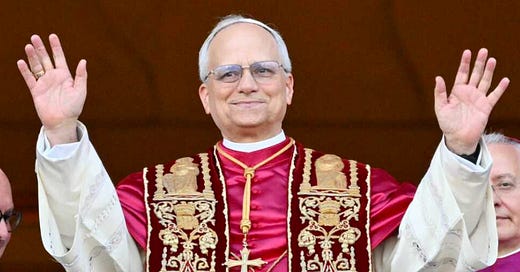Sunday Musings: The Purpose of the Pope
Thanks to social media and the movie “Conclave,” millions of people worldwide followed the death of Pope Francis and the process of selecting a new pope. They were swept up in the historic reverence and spectacle of the cardinals as they prepared to vote. Plenty of non-Catholics took to Facebook, Instagram and X to excitedly announce, “White smoke!” signifying that a new pope had been chosen.
Then speculation about Pope Leo XIV commenced. The native Chicagoan was certainly a Cubs fan. (False. He grew up on the South Side of Chicago and is a longtime White Sox fan.) Since he was appointed by Francis, he most certainly is a liberal-leaning clergyman who will create reforms in the Church. (There is no indication that he will do that.) He has said the Latin Mass several times as a priest, and recited the Lord’s Prayer in Latin during his first Mass as pope, so surely he will restore the Latin rite in every parish. (That’s not likely, since the “norvus ordo” is the predominant Mass around the world; however, he could be more tolerant of the Traditional Mass than his predecessor, who restricted its use and referred to it as potentially divisive.)
With so much hype about Pope Leo XIV and what his papacy should, could or would bring to the Church, it’s important to first discuss the role of a pope in the Catholic realm and the world.
The History of the Papacy
Leo XIV is the 267th pope of the Catholic Church. The first pope is considered to be St. Peter. Biblical scholars trace this back to chapter 15 of the Gospel of Matthew:
He said to them, “But who do you say that I am?”
Simon Peter said in reply, “You are the Messiah, the Son of the living God.”
Jesus said to him in reply, “Blessed are you, Simon son of Jonah. For flesh and blood has not revealed this to you, but my heavenly Father.
And so I say to you, you are Peter, and upon this rock I will build my church, and the gates of the netherworld shall not prevail against it.
I will give you the keys to the kingdom of heaven. Whatever you bind on earth shall be bound in heaven; and whatever you loose on earth shall be loosed in heaven.”
Peter probably had the hardest time as a pope. Jesus didn’t hand him a manual. He had to take everything he learned from Jesus and figure out how to establish the Christian Church. According to information from St. Peter’s Basilica in Vatican City:
Peter was considered as one of the pillars of the early church along with James and John. After Christ's crucifixion and resurrection, Peter began to preach his own version of Christ's teachings to everyone he could find. He began assuming the position of a leader and gathered a group of followers.
He took his preachings far and wide as he set out on various missionary activities. His dedication and contribution to the teachings of Christ and the Church is why he was considered the first Pope of Rome.
From Peter, the chair moved to Linus, then to Cletus, then to Clement I, and so on. Some popes were highly revered. Gregory the Great, Leo the Great, Leo XIII, John XXIII and John Paul II are widely regarded as having had positive papacies.
A few popes were downright bad. Alexander VI, Boniface VIII, Urban VI, John XII and Sergius III go down as some of the worst popes for a variety of reasons. Scandals have plagued the Church, most recently those related to child sex abuse and the mishandling of finances.
Just when it feels like the Church might be crumbling, hope rises. Although the number of Catholics in Europe is said to be dwindling, the Church is gaining members in the Americas, Africa and Asia. Pope Francis is credited with reaching out to Catholics in far-flung locations and from every walk of life. It is believed that Leo XIV, who spent most of his time as an Augustinian priest in Peru, will carry on the movement.
What Is the Pope’s Job?
Also known as the Bishop of Rome, the pope is the worldwide leader of the Catholic Church. He heads up the Holy See, the Church’s central government. As the leader of Vatican City and the Church, the pope’s duties are religious, moral and sometimes political.
The pope is the authority on Church teaching. That is why Catholics say that a pope is infallible; not that he is sinless, but that “through the guidance of the Holy Spirit, he and his brother bishops will be protected from error when teaching definitively on a particular doctrinal matter—thereby ensuring that the Church remains faithful to Christ’s truth.” Each pope has a different personality and his own way of leading his flock, but his overall mission should not change.
We don’t know what Leo XIV’s papacy will look like, but that isn’t keeping some people from trying to push it in one direction or another. Keep an eye out for quotes falsely attributed to him. Focus on actual quotes, like this one, that suggest the Church is in good hands:
“The Church is holy not because of our actions but because her head is Christ Himself. Our task is to live in conformity with Him, not to shape the Church in our own image.”
Via il Papa!




